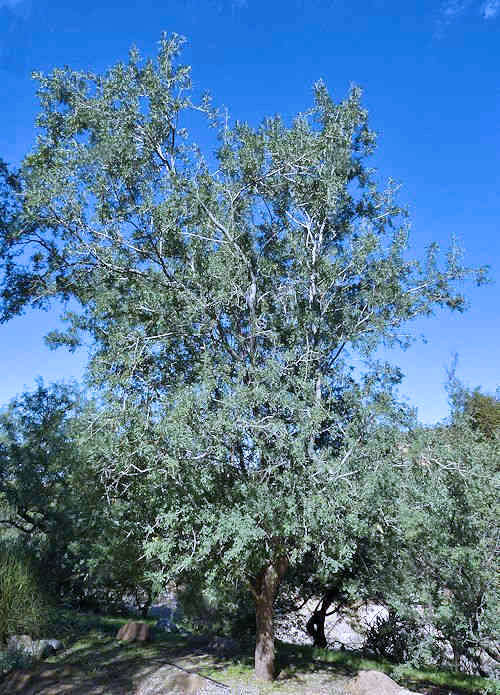Growing Olneya tesota:
Desert Ironwood
Back to Trees and Palms
Description
Form: A single to multi-stemmed shrub, or with pruning, a tree.
Lifespan: 50-150 years.
Leaf retention: Evergreen except will it will drop its leaves under three conditions: before blooming (which happens infrequently), prolonged drought, and freezing temperatures.
Growth rate: Slow. Supplemental water speeds growth.
Mature Size: 15-30' (4.5-9m) high and as wide.
Flowers: Pea-flower shaped, light purple wing petals with other petals being white or pink, clustered on short shoots that grow from the middle of stems.
Bloom: Spring, after its leaves have dropped. This plant usually blooms less than once every five years.
Fruit: A short brown seed pod. The pea-sized black seeds are edible only after roasting.
Leaves: Tiny, oval, thick, green to bluish-green, paired leaflets. Each compound leaf has a pair of thorns at its base. This plant provides medium shade.
Stems: The bark is smooth and thorny when young, cracked and furrowed when old. The wood is dense, heavy, sinks in water, and contains chemicals toxic to wood-rotting microbes.
Roots: Nitrogen-fixing*.
Wildlife: The flowers attract bees. The sap attracts bees and hummingbirds. The seed pods attract birds. The foliage is browsed by large mammals.
Toxic / Danger: Thorns. The wood contains toxins; sawdust is a possible breathing hazard.
Origin: California, Arizona, and Mexico.
Form: A single to multi-stemmed shrub, or with pruning, a tree.
Lifespan: 50-150 years.
Leaf retention: Evergreen except will it will drop its leaves under three conditions: before blooming (which happens infrequently), prolonged drought, and freezing temperatures.
Growth rate: Slow. Supplemental water speeds growth.
Mature Size: 15-30' (4.5-9m) high and as wide.
Flowers: Pea-flower shaped, light purple wing petals with other petals being white or pink, clustered on short shoots that grow from the middle of stems.
Bloom: Spring, after its leaves have dropped. This plant usually blooms less than once every five years.
Fruit: A short brown seed pod. The pea-sized black seeds are edible only after roasting.
Leaves: Tiny, oval, thick, green to bluish-green, paired leaflets. Each compound leaf has a pair of thorns at its base. This plant provides medium shade.
Stems: The bark is smooth and thorny when young, cracked and furrowed when old. The wood is dense, heavy, sinks in water, and contains chemicals toxic to wood-rotting microbes.
Roots: Nitrogen-fixing*.
Wildlife: The flowers attract bees. The sap attracts bees and hummingbirds. The seed pods attract birds. The foliage is browsed by large mammals.
Toxic / Danger: Thorns. The wood contains toxins; sawdust is a possible breathing hazard.
Origin: California, Arizona, and Mexico.
Cultivation and Uses
USDA hardiness zones: 9-11. Young trees are hardy to 25°F (-3.9°C), older ones to 20°F (-6.7°C).
Heat tolerant: Yes.
Drought tolerant: Yes.
Sun: Full sun.
Soil: Well draining, dry, low in organic content, pH 6.6-8.5 (neutral to alkaline). *Do not use a nitrogen fertilizer.
Water after becoming established: Once every month or two during drought.
Prune: Clip lightly to shape and thin. When the plant is young, trim to maintain a balanced shape. In the wild, these trees sometimes grow awkwardly unbalanced.
Litter: Leaf drop, which is prevented by monthly watering during drought.
Propagation: Seed.
Uses: Ornamental, low water (xeriscape) garden.
USDA hardiness zones: 9-11. Young trees are hardy to 25°F (-3.9°C), older ones to 20°F (-6.7°C).
Heat tolerant: Yes.
Drought tolerant: Yes.
Sun: Full sun.
Soil: Well draining, dry, low in organic content, pH 6.6-8.5 (neutral to alkaline). *Do not use a nitrogen fertilizer.
Water after becoming established: Once every month or two during drought.
Prune: Clip lightly to shape and thin. When the plant is young, trim to maintain a balanced shape. In the wild, these trees sometimes grow awkwardly unbalanced.
Litter: Leaf drop, which is prevented by monthly watering during drought.
Propagation: Seed.
Uses: Ornamental, low water (xeriscape) garden.
Comments
Olneya tesota is a member of the Legume family (Fabaceae) and is the only species in the Olneya genus. It is a protected species and long lived — some specimens are centuries old. A few commercial varieties have been selected for improved cold hardiness.
Do you have additional information or a different experience for these plants that you would like to share? Email info@GardenOracle.com. All contributions are welcome and appreciated.
Olneya tesota is a member of the Legume family (Fabaceae) and is the only species in the Olneya genus. It is a protected species and long lived — some specimens are centuries old. A few commercial varieties have been selected for improved cold hardiness.
Do you have additional information or a different experience for these plants that you would like to share? Email info@GardenOracle.com. All contributions are welcome and appreciated.





Latest update: September, 2024
© 2008-2025 by GardenOracle.com

